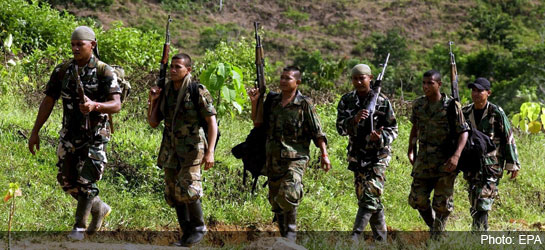
The Colombian Prosecutor General’s Office of Human Rights issued an arrest warrant Friday June 15 against an army captain accused by former paramilitaries of participating in a 2001 massacre against civilians, wrote the NGO Verdad Abierta on Friday.
The office said that recent testimonies given by former members of the far-right paramilitary group, the AUC, implicated captain Mauricio Zambrano in the planning of the El Naya massacre, which took place in April 2001 between the southwestern Valle del Cauca and Cauca departments.
The order to capture Zambrano was issued in mid-June after he had failed to show up for interrogations.
On April 21 2001, some 220 AUC paramilitaries arrived at the village of El Naya and killed between 24 and 200 villagers, according to various estimates. More than 3,000 residents were subsequently displaced under the pretext of the AUC fighting left-wing FARC guerrillas and their sympathizers.
According to the Prosecutor General’s Office of Justice and Peace, testimonies pointing to Captain Zambrano’s active coordination of the event came out in mid-June during a trial against 66 of the paramilitaries involved in the massacre.
The AUC member Armando Lugo, alias “El Cabezon,” one of the paramilitaries on trial for the massacre, said in 2010 that Captain Zambrano had allowed him access to a military base near El Naya, where war material used by the paramilitaries was allegedly obtained.
Other army contacts mentioned by “El Cabezon” were Colonel Tony Alberto Vargas Petecua and General Francisco Vargas Pedraza, who “El Cabezon” accused of giving the AUC the logistical means to carry out the massacre, reported Verdad Abierta.
In another testimony, Ikin Casarubia, alias “El Cura,” commander of the “Calima Bloc,” claimed to have been in direct contact with Pedraza, Vargas and Zambrano. “El Cura” also alleged that Vargas had given him around $8,400 to facilitate the incursion into El Naya, wrote Colombian newspaper El Tiempo.
The “Calima Bloc” of the AUC was formed in 1999 when top AUC commander Carlos Castaño “exported” around 50 paramilitaries from the northwestern Uraba region to the south of the Valle del Cauca department. The Bloc demobilized with 564 members in December 2005, under a peace agreement with the government of former president Alvaro Uribe.
Some reports indicate that members of the “Calima Bloc” have taken up arms again in the form of criminal gangs, known in Colombia as “Bacrim,” or emerging criminal groups.

